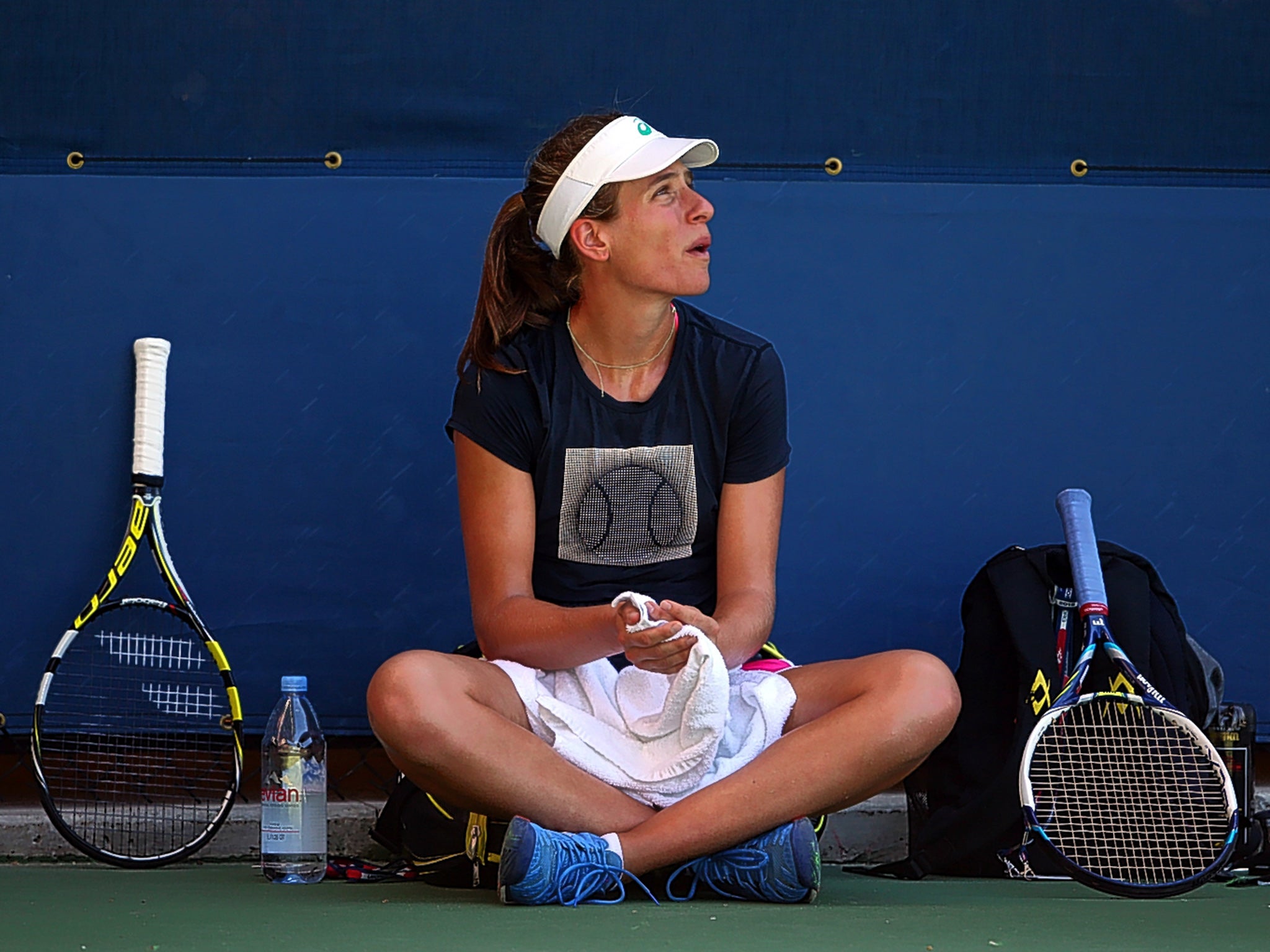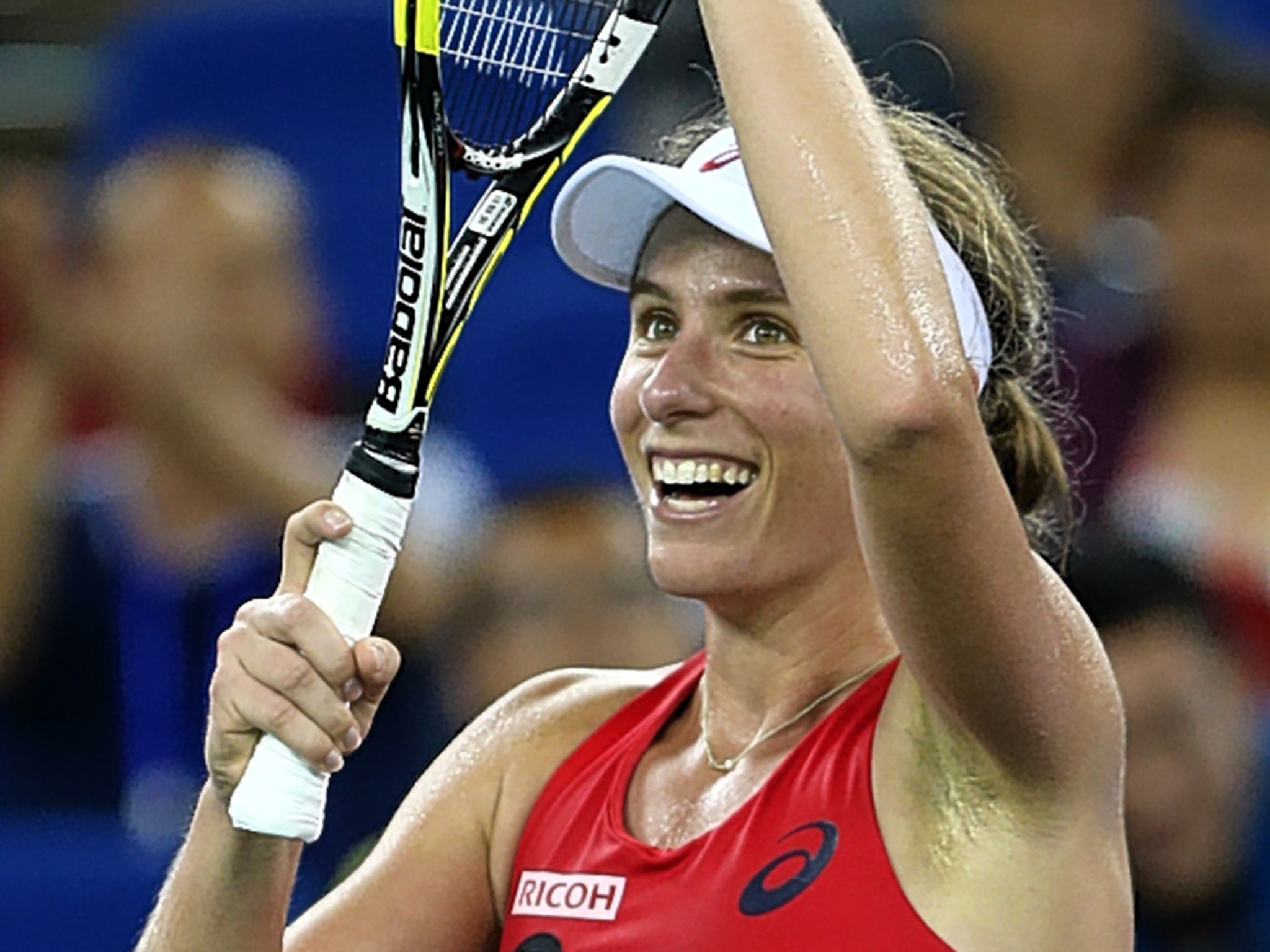Jo Konta cannot wait for 2016 as hard work opens up Slam opportunities
New British No 1 responded to a cut in LTA funding by shining at the US Open on her way to climbing into the world top 50

Your support helps us to tell the story
From reproductive rights to climate change to Big Tech, The Independent is on the ground when the story is developing. Whether it's investigating the financials of Elon Musk's pro-Trump PAC or producing our latest documentary, 'The A Word', which shines a light on the American women fighting for reproductive rights, we know how important it is to parse out the facts from the messaging.
At such a critical moment in US history, we need reporters on the ground. Your donation allows us to keep sending journalists to speak to both sides of the story.
The Independent is trusted by Americans across the entire political spectrum. And unlike many other quality news outlets, we choose not to lock Americans out of our reporting and analysis with paywalls. We believe quality journalism should be available to everyone, paid for by those who can afford it.
Your support makes all the difference.Jo Konta is looking forward to Christmas as much as anyone, especially with the prospect of her mum’s traditional Hungarian cherry soup dessert to savour. But for all the leading tennis players around the world this weekend will be the lull before the storm. Konta will spend Christmas at home in Eastbourne, but in six days’ time the British No 1 will be on a plane to China, where her 2016 season will start in the first week of January at the Shenzhen Open. She then plays in Tasmania before the Australian Open, which begins in Melbourne in less than a month.
Konta’s post-2015 season break is already a fading memory – she visited Rome, hiked in the Forest of Dean and climbed the Malvern Hills – and her pre-2016 season training is all but complete. The 24-year-old Briton, who climbed 103 places in the world rankings this year to finish the season at No 47, has been back at work for a month, having split her training time between Gijon in northern Spain, where her coaches Esteban Carril and Jose-Manuel Garcia are based, and the National Tennis Centre at Roehampton.
Less than a month ago Britain’s Davis Cup champions were lambasting the Lawn Tennis Association for its running down of Roehampton as a base for the country’s elite men and women, complaining that there were never any decent hitting partners there for them to practise with. “I’m here to hit!” an enthused Konta smiled as she sat back in a lounge at Roehampton following a strenuous training session. “Can you tell them I’m here to hit?”
Konta has had her own issues with the LTA, a cut in her funding having led to her taking her Spanish option. But might her example prove the wisdom of the governing body’s thinking?

Without the LTA’s financial support, Konta has worked tirelessly at her game and this year enjoyed the best season of her life. She became only the second British woman since 1991 to reach the fourth round of the US Open – where her 16-match winning run was finally ended by Petra Kvitova – beat three top-10 players in Simona Halep, Garbine Muguruza and Ekaterina Makarova, and overtook Heather Watson to become national No 1.
Konta is well aware of all the support the LTA has given her over the years, particularly in helping her to become a British citizen. Born in Australia to parents who had emigrated from Hungary, she has lived in Britain for 10 years, her family having come to Europe to help further her tennis career.
“It’s not something that I would like to get very involved in,” Konta said diplomatically when asked about the criticism of Roehampton and the LTA by Andy Murray and company. “The guys had their reasons for saying what they did and in all fairness there is truth behind that, but there is another side to things as well. I’m spending half of my pre-season here and there are a lot of good people here doing a lot of good work.”
Konta, who has had discussions with Peter Keen, the LTA’s recently appointed interim performance director, added: “I wouldn’t be where I am if it weren’t for [the LTA]. They’ve supported me for a number of years and I’m actually really excited for the vision that Peter Keen has brought on. I think he’s very good at what he does and whatever criticism comes his way I think it’s just an opportunity to improve.”
This time last year, when she was world No 150, Konta was not ranked high enough to gain direct entry into tournaments on the main tour and alternated between qualifying competitions and events on the lower-tier International Tennis Federation circuit. This year, ranked high enough to get into almost every event, she already has her first three months of the season planned. After Melbourne she will go to Israel (to play in the Fed Cup) then Acapulco, Monterrey, Indian Wells and Miami.
While Konta admitted that she felt physically tired at the end of last season, she never felt spent mentally. “I’m actually really looking forward to next season, to get out there and get going,” she said. “I will be playing a lot of tournaments I haven’t played before, a lot of main draws, week in week out, playing against the best players in the world. I’m very excited. Main draw of Slams. Wow!”
If Konta has been an unknown quantity for some opponents until now, she acknowledged that she would be “the hunted rather than the hunter” in some future situations. “I have no fear of that, no apprehension,” she said. “That’s just exciting.”
Two years ago perhaps the biggest question mark over Konta concerned her mental strength. Now, thanks in large part to the work she does with her mental coach, Juan Coto, a Spaniard based in London who has been a regular visitor to Roehampton recently, it is one of her great strengths.
“I invest just as much time mentally as I do physically,” Konta said. “I’m constantly working on getting myself more solid mentally and just really preparing myself for the new challenges that I’ll face.”
She added: “It’s no secret that I had done a lot of hard work on that, for a number of years, not just this past year. It was nice that things did become more coherent [this year], just more understanding from my end. I understood more how I wanted to be and how I wanted to think out there. And when you take the interference and the stress away, you give yourself the best opportunity to play well for longer.”
Join our commenting forum
Join thought-provoking conversations, follow other Independent readers and see their replies
Comments